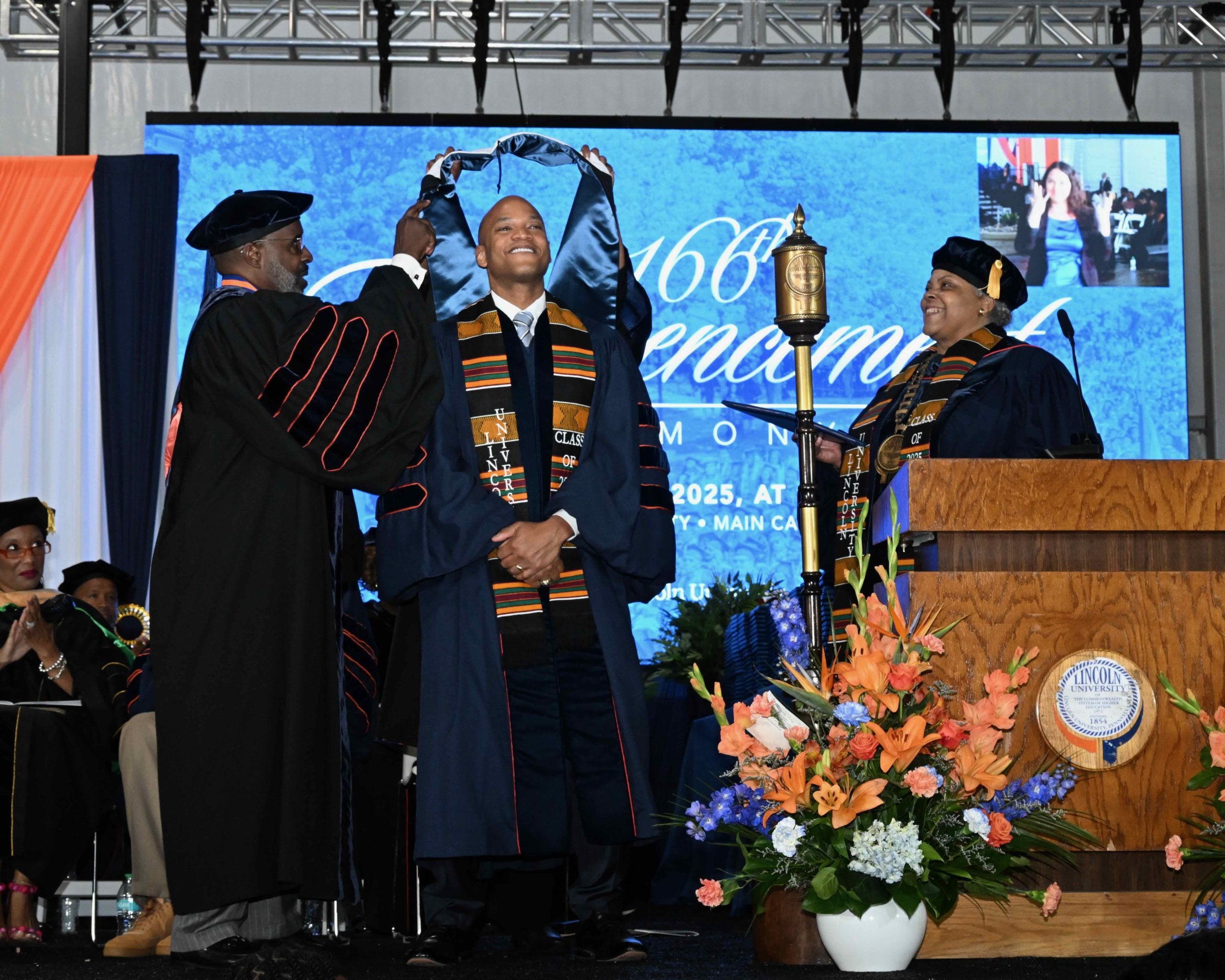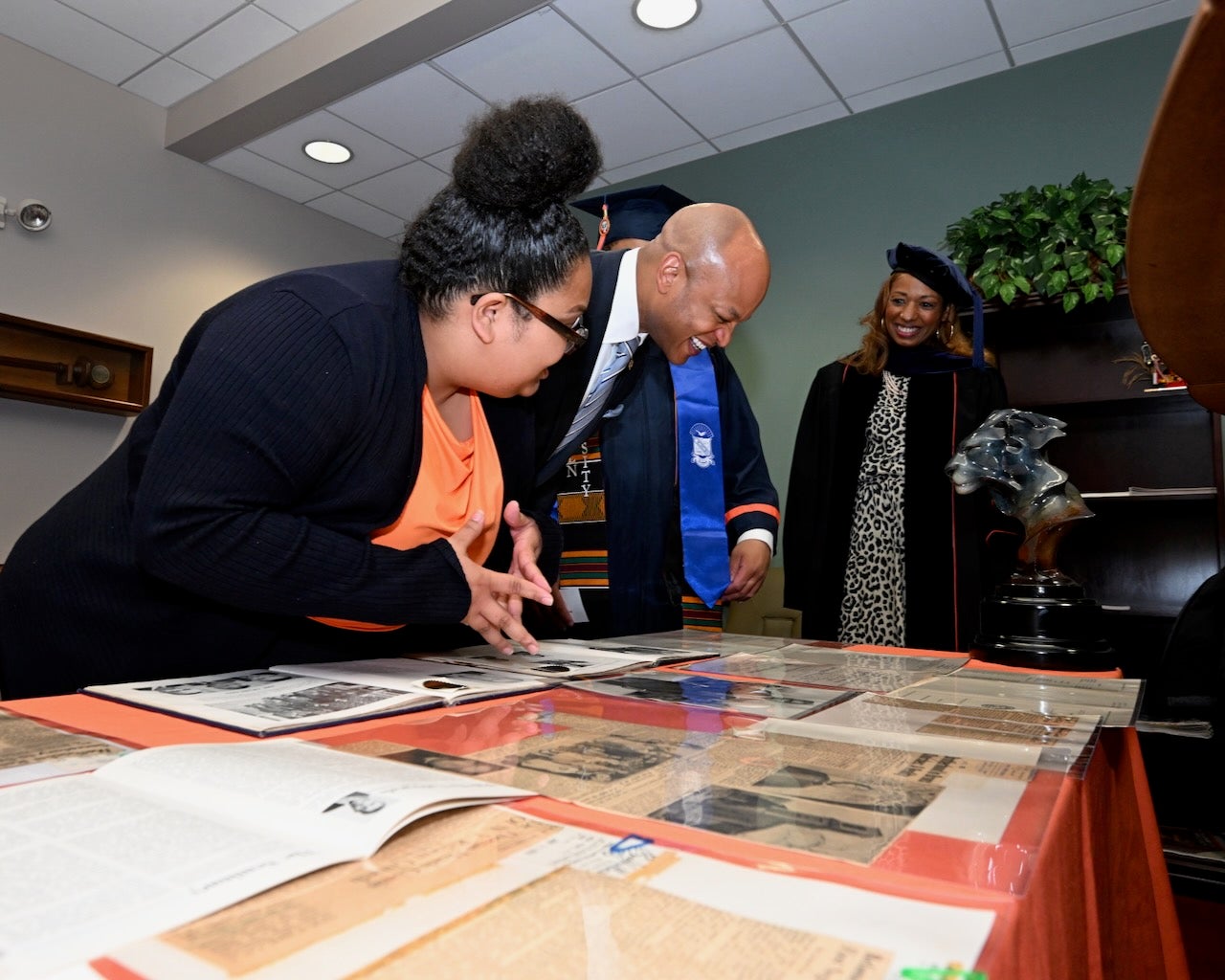In a commencement address that traced his own family’s journey through America’s complicated past, Maryland Governor Wes Moore delivered a powerful message to Lincoln University’s Class of 2025—one about true patriotism and the shoulders we stand on.
Moore—Maryland’s first Black governor and only the third Black person ever elected governor of any U.S. state—wove personal narrative into national purpose, urging graduates to embrace a more nuanced vision of what it means to love one’s country.

At the heart of Moore’s address was the remarkable story of his grandfather, Reverend Doctor James Thomas, a Lincoln University graduate whose journey from “American exile to American patriot” formed the emotional backbone of his message.
“My grandfather was born in South Carolina, the child of Jamaican immigrants new to the United States,” Moore told the graduates. “But when he was just a child, he and his parents fled back to Jamaica—chased away by the Ku Klux Klan.”
This early trauma—being rejected by his country because of something “that should have been a source of pride, not prejudice”—didn’t extinguish James Thomas’s love for America. While most of Moore’s extended family vowed never to return to the United States, his grandfather did.
“In all of his endless humility, my grandfather would often say, ‘This country would be incomplete without me!’” Moore recalled.
Delivering the speech at his grandfather’s alma mater made the moment even more personal. Before the ceremony, Moore was shown artifacts from his grandfather’s time at Lincoln—his transcript, newspaper clippings and more.
“I get emotional when I think about that moment of standing in the same spaces that he did,” Moore shared with ESSENCE in an interview after the speech. “It serves as an important reminder of what he had to endure… his earliest memories in life were watching this country reject him.”

For Moore, this family history isn’t just a personal story but a powerful lens through which to understand our collective national journey. “It reminds me,” he explained, “that in this moment when people are watching what is happening to so many communities when people are watching an assault on our history and an assault on our livelihood, I think people also are learning and will continue to learn that we don’t flinch, and you are not going to intimidate us, because we’re just built differently.”
Lessons On Patriotism
Through his grandfather’s example, Moore outlined what he called three lessons he learned about patriotism in his commencement address that challenge simplistic notions of national identity:
1.Patriotism is never passive: “Your love of country will always be tested—in ways both big and small. Patriotism is a responsibility of a lifetime.”
2.Loving your country doesn’t mean believing it’s perfect: “Being an American has always come with struggle and sacrifice.”
3.Skepticism about your country is justified: “Loving your country doesn’t mean lying about its history! But you should always keep skepticism as your companion, never your captor.”
Moore expanded on this framework, noting that patriots “are people who are willing to sacrifice their today for a better tomorrow for others.” He emphasized that patriots understand the “unevenness about this country’s history” without concluding that America is “irredeemable.”
Moore positioned today’s America as divided between false extremes: “those who use patriotism as a club to beat others… and those who feel ashamed to bear the flag,” and between “those who think loving America means hating half the people in it…and those who allow cynicism about our nation’s history to obscure their aspirations.”
This binary, Moore argued, “leaves no room for someone like my grandfather” or for himself—”a boy who felt handcuffs on his wrists when he was just eleven years old because I grew up in a community that was overpoliced… but who now stands before you as the 63rd governor of my state.”
The governor challenged the graduating class to embrace a more nuanced perspective: “The hard part is being honest about our flaws—and courageous in addressing them.”
Built For a Moment Like This
Moore drew powerful parallels between Lincoln University’s founding in 1854, during a period of intense national discord, and today’s challenges.
“Lincoln was built for a moment like this because it was built in a moment like this,” he told the graduates, highlighting how the university was founded at a time when “our nation’s fabric was being tested… and it wasn’t entirely clear if we would end up a true, unified nation after all.”
This historical context frames Moore’s call for graduates to be engaged citizens in our current moment of division. “I am here today not just because Lincoln University is one of the premier institutions of higher learning in this country,” he said, “but because I would not be here without you. This school created a way for me… because you created a way for James Thomas, my grandfather.”
Throughout his address, Moore emphasized the importance of recognizing patriots in all their diversity. He specifically highlighted graduates of different backgrounds, including international student Valerie Ottutu from Nigeria, who graduated with a computer science degree and secured a position at a Fortune 500 company.
Valerie was born in Nigeria. But she came to the United States because she knew this country would be incomplete without her!” Moore declared in his speech.
When asked about the importance of highlighting immigrants as patriots, Moore told ESSENCE, “People are too easy to bastardize this term patriotism… The thing I wanted to highlight is that when we talk about patriots, my grandfather was maybe the greatest patriot that I’ve ever met.”
Understand The Assignment
Moore concluded his address with a powerful charge to the graduates: “Live in such a way… that when you hand off this country to the next generation… your descendants will say back… ‘They understood the assignment.’ That is the most patriotic thing that you can do.”
He elaborated on this “assignment” for today’s graduates entering a divided America: “I’m asking them to lean in, and I’m asking them to truly be patriots… not in this faux definition of the word. A patriot is someone who understands this country’s history but doesn’t use that as an excuse to lean out, but they use it as a motivation to lean in.”
“I want them to be a part of history,” Moore said of the graduates. “I want them to put their fingerprints on a better future. And I want them to understand that, as my grandfather has said, this country is incomplete without them.”
Despite speculation about a possible presidential run in 2028, Moore told ESSENCE he remains firmly focused on addressing current challenges. “Anybody who is spending their time positioning themselves for 2028 is not taking 2025 seriously,” he said firmly. “I’m seeing federal workers who are my folks getting laid off. I’m seeing how our economy is getting thrown into the wind with these random tariff policies.”
The governor emphasized his commitment to his current role: “I’m very focused on making sure that in this time of crisis and in this time of chaos, the people of my state know they have a fighter as their governor, and they have someone who meets chaos with calm and meets chaos with resolve.”
In a time marked by division and distrust, Moore’s message delivered a vision of patriotism that is active, honest and inclusive—one that honors the past while committing to a better future.
“Class of 2025, you are the living custodians of our nation’s past and the architects of its present,” Moore said. “And the relationship you build with this country will help determine our future.”
